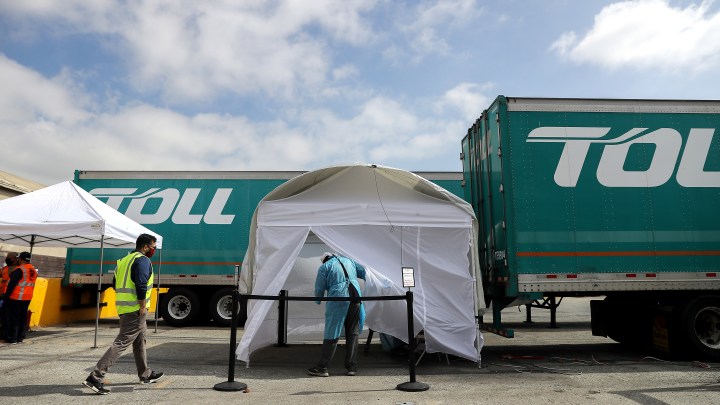
New California law will require employers to notify workers of COVID-19 cases
New California law will require employers to notify workers of COVID-19 cases

As we head into what looks like a third wave of COVID-19, many workplaces are still struggling to figure out how to best handle the virus — should workers stay home? When should they come back? Should employers administer tests? And who gets told the results?
The lack of a strong set of binding national rules for much of this has left many states to fill in the gaps. In California, a new law will go into effect in January that sets up specific requirements for employers when someone in the workplace gets COVID-19.
One example: There’s been no work-from-home or shelter-in-place for tens of thousands of warehouse workers in Southern California, said Sheheryar Kaoosji, executive director at the Warehouse Worker Resource Center.
“We call them essential workers; we talked about how important they are,” he said, yet often they haven’t gotten essential information about COVID-19 cases on the job.
“There was a lot of fear,” Kaoosji said. “A lot of the time the employer would say, ‘Well, I can’t tell you that,’ or ‘we’re not going to talk about that.'”
But starting at the beginning of next year, California employers will have to notify all workers of any potential COVID-19 exposure in the workplace within one day of learning of the risk and inform public health authorities of an outbreak of three or more infections within two weeks of one another.
Nationally, employers have no such obligation, said Debbie Berkowitz, worker safety and health program director with the National Employment Law Project.
“Knowledge is power,” she said. “Without that information, I don’t really know how workers can protect themselves.”
While a handful of states have adopted some form of reporting requirement like California’s, the federal government has only made nonbinding recommendations.
The lack of federal reporting requirements sometimes leaves resource-thin public health departments to discover workplace clusters only through lengthy investigations.
“In the absence of any requirement, it is almost impossible for the local public health agencies to prevent the spread of COVID-19 in the community,” Berkowitz said.
But informing an entire workforce of potential COVID-19 risks can be complex for organizations, said Sean Kramer, an employment law attorney with Ogletree Deakins in San Francisco. He cited the example of a truck driver who visits multiple sites and has many limited interactions.
“There’s the potential for over-notification to employees as a sort of a stop gap or a failsafe,” he said. “It may ultimately scare employees.”
And while the California law prevents employers from naming names, in many workplaces the identity of an infected person would be hard to hide, raising privacy concerns.
There’s a lot happening in the world. Through it all, Marketplace is here for you.
You rely on Marketplace to break down the world’s events and tell you how it affects you in a fact-based, approachable way. We rely on your financial support to keep making that possible.
Your donation today powers the independent journalism that you rely on. For just $5/month, you can help sustain Marketplace so we can keep reporting on the things that matter to you.


















